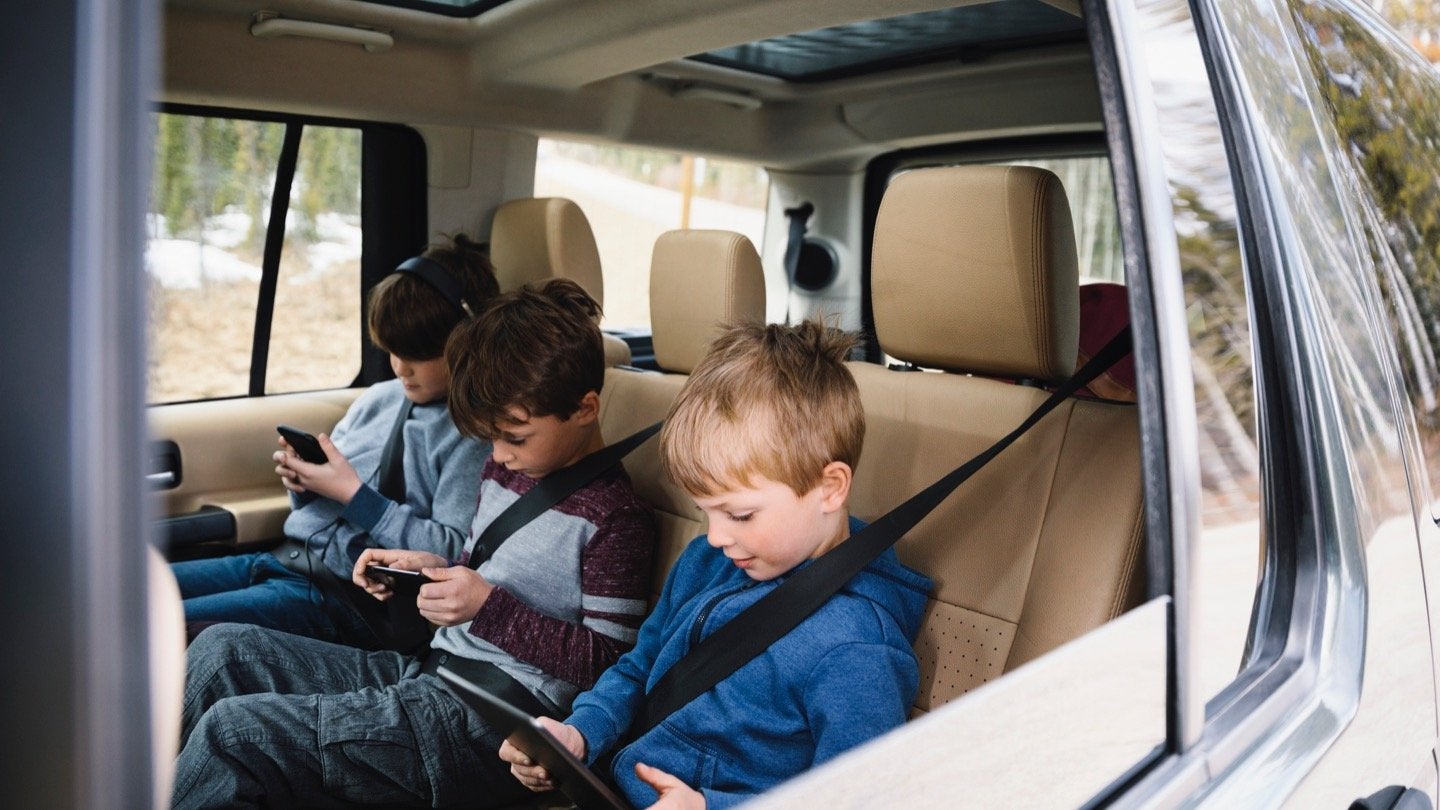- Most new cars come with Wi-Fi technology, but you can add Wi-Fi equipment to most vehicles manufactured after 1996.
- Wi-Fi plans for vehicles start as low as $20 per month and may include unlimited data.
- Car Wi-Fi is different from a mobile hotspot and is likely to give you a better connection while preserving your mobile data and phone battery.
- The in-car Wi-Fi market is estimated to grow 49.01% by 2028.
What has four wheels and Wi-Fi? Possibly your next car, truck or SUV. Or, with some new equipment and a Wi-Fi plan, it could be your current car.
We use Wi-Fi almost everywhere, so why not have it in your car as well? Some internet providers and car manufacturers agree and are making connections more accessible to drivers.
If you want Wi-Fi in your car, whether to appease the kids in the backseat or accommodate your associates in the carpool, you have a few options. Here’s what you need to know.
How do you get Wi-Fi for your car?
Many newer model vehicles come with built-in Wi-Fi equipment. But if you aren’t in the market for a new car — or the one you want doesn’t come with the technology — there are a few devices to help you bridge the gap. Finally, once you have a means to receive internet service, whether through a built-in system or add-on equipment, you’ll need a Wi-Fi plan.
What cars have built-in Wi-Fi?
Many manufacturers are adding built-in Wi-Fi equipment to their new vehicles. That’s not to say these vehicles come with Wi-Fi included, but they are service-ready without any additional equipment needed.
Some popular manufacturers that are producing select vehicles with built-in Wi-Fi technology include:
- Acura
- Audi
- BMW
- Buick
- Cadillac
- Tesla
- Jeep
- Chevrolet
- Chrysler
- Dodge
- Ford
- Honda
- Infiniti
- Jaguar
- Land Rover
- Lincoln
- Mercedes
- Nissan
- Porsche
- Subaru
- Volvo
- Kia
- Toyota
- Hyundai
- Mazda
- Lexus
Some vehicle manufacturers have built-in programs like On-Star, Entune and Uconnect Web, among others, that you can subscribe to monthly. They are good for hands-free calling for the driver, hearing weather reports and alerts, and accessing mechanical and emergency help. Passengers are also able to use the internet on their devices.
However, not all new vehicles from these manufacturers come with built-in Wi-Fi. If you’re interested in having the technology in your new vehicle, speak with an auto sales professional about the specific models that come with Wi-Fi equipment.
How can I add Wi-Fi in my car?
Built-in Wi-Fi is convenient, but it probably doesn’t warrant buying a new car. However, it’s possible you can still get Wi-Fi in your car; you need the right equipment.
OBD II devices
Some car Wi-Fi devices, like the AT&T ZTE Mobley™ | 503 or the Verizon Hu OBD reader, plug into your car’s OBD II port. These devices are often available from the service provider and may cost $100 or more.
You may be wondering, what’s an OBD II port and where do I find it? It’s most likely located below your steering column or dash. It’s what mechanics plug into to run vehicle diagnostics, but you can use it to create a Wi-Fi hotspot.
Installed wireless routers
While more expensive than OBD II devices, an installed Wi-Fi router will give you a better connection and you won’t have to worry about plugging in anything. Car routers can range from $200 to $600 and should be professionally installed.
What providers offer Wi-Fi service for cars?
Regardless of what equipment you use, you’ll need a mobile plan. Major cellular providers including AT&T, T-Mobile and Verizon offer Wi-Fi plans specifically for vehicles.
| Provider | Starting price | Required plan |
|---|---|---|
| AT&T | $10/mo. | Unlimited |
| Verizon | $10/mo. | Unlimited or Data-Only |
| T-Mobile | $20/mo. | Unlimited |
Car Wi-Fi plans
Car Wi-Fi pricing varies by provider and plan. Additionally, you may need cellular service from a specific provider to be eligible for their service or special pricing.
Pay-as-you-go plans may also be available, ideal for a summer road trip or long drives to visit family over the holidays. With these plans, you pay for an allotted amount of data and use it at your convenience.
Verizon, for instance, has non-cellular customer plans for $20/mo. for Bentley, BMW, Kia, Mazda, Toyota, Lexus and VW.
Contact your cellular service provider for more information about car Wi-Fi plans and equipment costs.
Car Wi-Fi restrictions
Some providers may have data restrictions, so keep that in mind while shopping for a plan. Not all providers require you to be a cellular or internet customer and you may be able to get a Wi-Fi plan for your car from them without signing up for other services.
Signal quality depends on your proximity to towers, so your service may fade in and out as you are traveling. Parking at a lot or rest area can ensure you have a more stable connection.
Benefits of car Wi-Fi
Wi-Fi in a vehicle can be a good option if you travel long distances with children, making games and movie viewing easier. It can also provide live traffic updates and weather conditions.
Having internet access can also provide you with easier access to emergency or roadside services.
For business, it’s handy to stay in contact with your office and join meetings – if you aren’t the driver! Remember, most states have a hands-off device or no texting/driving law for operators of motor vehicles.
How is Wi-Fi in your car different than a mobile hotspot?
Most smartphones come equipped with a mobile hotspot function and providers offer the service at no extra charge, so why would you need a Wi-Fi connection in your car? There are a few reasons why you might prefer a car Wi-Fi over a mobile hotspot.
- You’re likely to get a stronger signal. With a mobile hotspot, your phone uses a built-in antenna to receive a signal. With Wi-Fi, your car is essentially the antenna, bettering your chances of receiving a strong, reliable signal.
- If the car is on, so is your connection. OBD II devices run on your vehicle’s power, so when your vehicle is on, so is your Wi-Fi.
- It’ll save your phone’s battery… If you’ve used your phone as a mobile hotspot, you know how it can drain your battery. This may not be a big deal if there’s a charger handy, but that basically means no one else gets to charge their phone.
- …and your mobile plan’s data. Sure, everyone in the office carpool has a smartphone with hotspot capabilities, but who is willing to sacrifice their data so that others can connect? And what happens to the connection when you drop them off at the end of the day?
- It works with your vehicle. Features like location sharing, driving history and crash response come with Verizon’s Hum device and service. Additionally, select vehicles with built-in Wi-Fi can run diagnostics and software updates remotely, without needing a trip to the dealership.
So, is car Wi-Fi worth it?
Right now, Wi-Fi in your car may be worth it in situations where multiple passengers could use the connection either daily or on a trip. But, if you aren’t frequently playing chauffeur or don’t have any big road trips planned, you may not need an in-car Wi-Fi connection.
The next time you buy a new car, however, it’s likely to have Wi-Fi technology built-in, whether you plan on using it or not. As the technology becomes more available, look for cellular service providers to offer more plans and features around Wi-Fi for your vehicle.
How else can you get connected in your car?
There are other options than a Wi-Fi connection if you need internet in your car, truck, RV or SUV.
Mi-Fi
You can use a MiFi device to access the internet (through Wi-Fi) when you are on the go. This mobile Wi-Fi router can get you online in your car, a bus, RV or train. The benefit of a Mi-Fi device is that you won’t be relying on cellular data to run it and you can connect multiple devices at once.
RV satellite
Satellite internet providers like Starlink, Hughesnet and Viasat offer plans specifically tailored to getting internet in a recreational vehicle. They can be pricey, but you can buy them on-demand and pause when you stop traveling. You must be parked to receive the signal, but it far better in speed and availability than using your cellular data.
Portable and mobile hotspots
As mentioned above, mobile and portable hotspots are always on option for internet in a moving vehicle. Most newer cell phones have a built-in mobile hotspot that you’ll need to turn on with your provider. Some of them have extra fees involved, data caps and can strain your phone’s battery with extended use.
Purchasing your own portable hotspot with a data plan that is outside of your cell phone plan. They can get pricey, but they are an excellent option to get internet in your car if you intend to use it other than in an emergency.
Remember to stay safe and secure on the road!
Along with being mindful of the roadway, keep in mind that someone in the next car over may have access to your mobile Wi-Fi connection. Use a VPN or treat your in-car Wi-Fi connection like a public Wi-Fi network. Avoid entering any sensitive information, such as passwords or banking info, while connected. Safe travels!
Wi-Fi in cars FAQs
You can get Wi-Fi in your car via your cell phone’s hotspot, by purchasing a separate Mi-Fi device and plan or getting a recommended plan from your car’s manufacturer for nationwide providers like AT&T, T-Mobile or Verizon.
If you need to access the internet while traveling locally, regionally or nationally, yes, having a dedicated Wi-Fi plan for your car will be worth it just not to pay overage fees on your cell phone plan.
If you use your cell phone’s hotspot, it can get costly if you go over your data cap. For built-in car Wi-Fi, plans run around $20/mo.
That depends on the plan you have, but generally an average of five to seven devices can run off of a car’s Wi-Fi connection.
Written by:
David AndersSenior Writer, Broadband Content
David joined the Allconnect team in 2017, specializing in broadband and TV content. His work has been referenced by a variety of sources, including ArcGIS, DIRECTV and more. As a Senior Writer, David is motivate…
Read more
Edited by:
Robin LaytonEditor, Broadband Content
-
Featured
![Airlines with in-flight Wi-Fi: How to stay connected in the air]() Airlines with in-flight Wi-Fi: How to stay connected in the air Camryn Smith — 3 min read
Airlines with in-flight Wi-Fi: How to stay connected in the air Camryn Smith — 3 min read -
Featured
![Can other Wi-Fi networks interfere with mine?]() Can other Wi-Fi networks interfere with mine? Robin Layton — 4 min read
Can other Wi-Fi networks interfere with mine? Robin Layton — 4 min read -
Featured
![18 tips to improve your internet connection and boost Wi-Fi signal]() 18 tips to improve your internet connection and boost Wi-Fi signal Camryn Smith — 9 min read
18 tips to improve your internet connection and boost Wi-Fi signal Camryn Smith — 9 min read
Latest
-
Wednesday, April 24, 2024
Why do you need an Optical Terminal Network?Taylor Gadsden — 2 min read
-
Tuesday, April 23, 2024
Worried about losing your TV signal? This is how to keep your satellite dish cleanDavid Anders — 6 min read
-
Tuesday, April 23, 2024
How to change your Wi-Fi network passwordCamryn Smith — 2 min read





